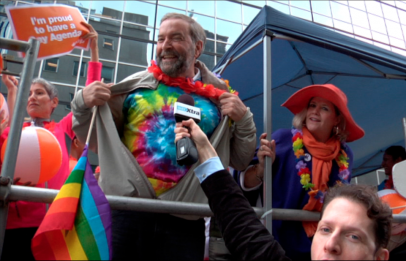
(NDP leader Tom Mulcair — seen here looking animated and relaxed at Toronto Pride 2015 — may seem stiff in some interviews but that won’t deter my vote for the NDP’s compassionate vision to put Canada back on track./Daily Xtra photo.)
It’s easy to be charmed by Liberal leader Justin Trudeau. He’s charming, affable, approachable and seems to exude sincerity — a breath of fresh air after 10 years of Conservative rule by Stephen Harper. More so than his stiff NDP opponent Tom Mulcair, it’s increasingly Trudeau who seems like the natural choice for change in Ottawa.
Until you remember the 1990s.
Though the Liberal and NDP platforms seem remarkably similar now, it’s the Liberal party that initiated cuts to transfer payments to the provinces in the mid-1990s, plunging health care and other pillars of Canada’s social infrastructure into a new era of underfunded decline.
In the Liberal party’s push to renew some of that funding now, it differs from the NDP on one key point: it cut the funding in the first place. The NDP, in contrast, has consistently put forth a vision of Canada that values social services and cares for the most vulnerable members of our society.
“The NDP knows that one of the most important ways to judge the conscience of our country is how we treat our most vulnerable citizens. Our government has to do more. Much more,” the NDP writes in its 2015 platform.
It’s language like this that’s absent from the Liberal platform.
Though the 2015 Liberal platform also promises to support families, children and seniors, to create 40,000 jobs for youth, to eliminate income splitting and other tax breaks for the wealthiest Canadians, to work with the provinces to invest in health and home care, to work with First Nations, to make Parliament more transparent, to tackle climate change, and even to run a deficit to reinvest billions of dollars in infrastructure, the ideology underpinning its platform seems more focused on supporting the middle class than the most vulnerable.
The Liberal party, for example, would add a new tax bracket for Canadians making more than $200,000 per year so it can cut the tax rate for people in the middle-income tax bracket. According to its platform, this will save middle-class individuals an estimated $670 per year.
Whereas the NDP promises to raise the corporate tax rate from 15 to 17 percent and close tax loopholes currently available to wealthy CEOs, then allocate the more than $3 billion in anticipated new revenue towards eliminating poverty, investing in a national $15-a-day child care program, and prioritizing health care.
Strikingly similar in overall content, perhaps, but the two platforms still reveal some important differences in ideology.
That the Liberal party has even shifted this far back towards social spending either shows a commitment to restoring some of the support that it stripped — or a calculated repositioning to capitalize on both a decade of cold Conservative rule and last election’s unexpected surge of support for the NDP.
I’d lean towards the latter: the Liberals’ renewed compassion seems as much calculated as sincere to me.
Which is not to suggest that NDP leader Tom Mulcair isn’t opportunistic as well. I find him stiff and his sincerity a bit difficult to gauge, though his willingness to risk crucial seats in Quebec — rather than pander to Harper’s divisive posturing over the niqab — is reassuring.
The NDP’s definitive promise to repeal Bill C-51 — the anti-terrorism law that so many experts consider a significant threat to civil liberties across Canada — is also reassuring. More so than the Liberals’ promise to repair a few of its more problematic elements, while maintaining its overall framework of surveillance and distrust.
It’s also worth noting that the NDP dedicates a section of its platform specifically to the LGBT community. “The NDP has a proud history of supporting progressive, inclusive policies and ending all forms of discrimination against Lesbian, Gay, Bisexual, Transgender and Queer (LGBTQ) Canadians,” the party writes in its platform.
The NDP says it will continue to push for trans rights; suspend “criminal records for individuals convicted of outdated and discriminatory offences which are no longer illegal;” revisit “service records for those discharged from the Canadian Forces on the basis of sexual orientation or gender identity;” and issue an “official apology for civil servants fired on the basis of sexual orientation or gender identity.”
The Liberal party has no comparable section in its platform.
Needless to say, neither does the Conservative party, whose stingy, divisive, punitive, fear-mongering moral code holds no appeal for me.
This election, I’m ready to give the NDP its chance to form government and to redirect our country along more genuinely compassionate lines.
Who are you voting for?
(Robin Perelle is the managing editor of Daily Xtra in Vancouver. Email her at robin.perelle@dailyxtra.com or Tweet her @RobinPerelle.)

 Why you can trust Xtra
Why you can trust Xtra


